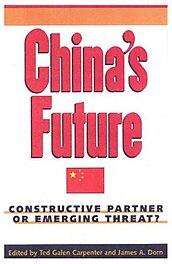Is China a rising colossus that intends to bully its neighbors and dominate Asia? Should Washington adopt a more hard-line policy toward the PRC on trade, human rights, and national security issues? Or is China a country that has already moved far along the road to a market economy and a more open society and is committed to being a stabilizing, cooperative power?
The distinguished contributors to this book examine those questions and their implications for U.S. policy. They also consider both the short- and the long-run prospects for the evolution of a peaceful and prosperous “new China,” given the background of 50 years of communist rule. The likely accession of China to the World Trade Organization adds another crucial dimension to that country’s relations with the United States and other countries.
The election of Chen Shui-bian as Taiwan’s new president and the defeat of the long-dominant Nationalist Party are stern reminders to the Chinese Communist Party that its own future is highly uncertain. Moreover, the Taiwan issue itself remains an especially dangerous flash point. Whether China’s future is as a constructive partner or an emerging threat ultimately will depend, says Liu Junning in his chapter, “on the fate of liberalism in China: a liberal China will be a constructive partner.” This book examines the complex issues surrounding that momentous choice.
